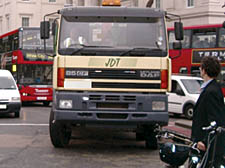| |

Cyclists face dangers from trucks across the capital |
Educate drivers and save cyclists
Following the tragic death of her friend earlier this year, Emma Chesterman is campaigning to reduce the dangers to cylists posed by heavy good vehicles
IT HAS been 10 months since my friend was killed by a lorry while cycling to work.
Eilidh Cairns, 30, who lived in Kingswear Road, Highgate Newtown, died in February after being crushed by a truck in Notting Hill Gate while on her way to work.
Eilidh was a very confident and experienced cyclist and took that route every day. Despite family appeals for witnesses, we still do not know how it happened. It was not a case of the HGV turning left.
Since Eilidh’s death, her sister, Kate, and I have been campaigning with friends to reduce the number of cyclists being hit by large goods vehicles to zero.
We recently formed an action group, SeeMeSaveMe, which has around 70 members. We are determined to do all we can to ensure that the tragedy of people being killed on our roads is given the attention that its needs from our politicians .
There have been eight cyclists killed by HGVs so far this year, seven of them women. And while cyclist fatalities in general are on the decrease, fatalities caused by collisions with HGVs are rising. As the number of people cycling grows, there seems to be no direct measure to tackle this problem.
Our action group has created a petition on the Prime Minister’s website, calling for the introduction of new measures to end the fatalities caused by large goods vehicles. It is seeking driver training and vehicle improvements and a permit system to prevent vulnerable cyclists having to share city roads with large goods vehicles with limited visibility in rush-hour.
Cyclist education is very important. There are lots of great schemes, such as Camden Council’s, that aim to educate cyclists about the dangers of sharing road space with large vehicles, but there are no steps being taken to help the drivers of HGVs navigate their way safely through the busy streets of central London.
A report from 15 years ago showed that HGVs accounted for 30 times as many cyclist deaths as cars in London, a high proportion of these deaths being women. The report by Professor Mark McCarthy recommended an immediate further investigation by the government and a ban on heavy goods vehicles in urban areas if certain safety standards were not met. These standards have not been met. HGVs continue to drive around with blind spots and the deaths continue to happen. We need up-to-date statistics to fully understand cyclists’ exposure to these hazards.
While Tory mayor Boris Johnson attempts to get more people on their bikes in the city, the dangers that cyclists face are not being addressed. Rather than making it safer for cyclists and vehicles to share road space, he has taken a step backwards by axing the CVEU (Commercial Vehicle Education Unit) who have specific powers to improve safety. To promote cycling yet ignore the associated hazards seems irresponsible.
The solutions presented so far would not have helped Eilidh: she was in the right place, she could not have done anything else. Sadly, I know four of the people killed by HGVs in the last two years and I am just one person. The ripple effects that these deaths have on families, the truck drivers and the victim’s employers are greatly felt.
Whilst the council are making steps towards educating bike users on the dangers of HGVs, they could follow the example of Lambeth and provide their own drivers with awareness training. It is surely the responsibility of the employer to support the safe conduct of their employee. The road is a workplace for HGVs – an extension of the Health and Safety law on driving while at work would acknowledge this.
We really need to treat each other respectfully on the roads. That means safe cycling and educated drivers who understand the vulnerability of people on bikes.
There seems to be something endemic in our culture that treats the cyclist as an annoyance on the road – if they put themselves on the busy road in the first place then it is their fault if they are hurt.
We are devastated by the death of Eilidh, she was an amazing friend and very determined in her life. This is why we are determined to try and do what we can to make sure this doesn’t happen to anyone else.
|
 |
|
|
 |
| |
| |